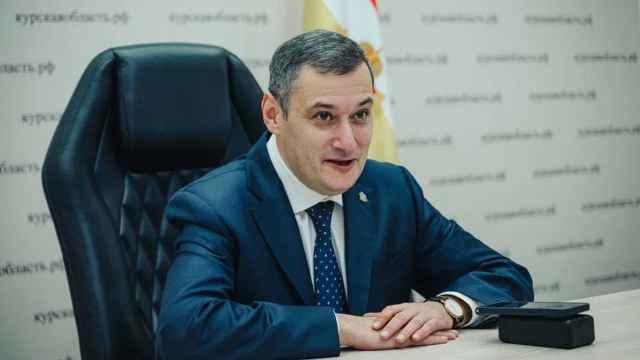Russia, one of the world's main wheat exporters, has cut grain exports to all but a few countries after imposing tougher quality checks, an exporters' lobby group said Wednesday.
The Agriculture Ministry had said Tuesday that it would avoid such curbs even though exports are at record levels following the ruble's slide against the dollar.
Russia's Veterinary and Phytosanitary Surveillance Service (VPSS) said it had started to pay "special attention" to the quality of grain sent for export.
It said it was issuing export certificates only when the quality conformed with the rules of importing countries.
"Russia has always been considered to be a grain power and we cannot lose this status due to defects in the products sent for exports," VPSS spokeswoman Yulia Trofimova said, adding there was no data available on whether this was curbing exports.
A Russian grain exporters' lobby — the National Association of Exporters of Agricultural Products — wrote to the government to complain that the phytosanitary service was only allowing exports to Egypt, Turkey, India and Armenia.
"This is nothing more than a hidden form of state regulation of grains," the group said in a letter to Deputy Prime Minister Arkady Dvorkovich. Reuters obtained a copy of the letter.
Traders have forward contracts for Russian grain until April and say the country can export about 30 million tons without eating into its domestic needs, the group said.
The Agriculture Ministry has also put 2014-15 grain exports at 30 million tons. So far Russia has exported 19 million tons, including 15 million tons of wheat.
The group asked the government to set a level for the maximum volume traders can sell during the 2014-15 marketing year started on July 1 and allow exporters to fulfill all contracts. Then the government could consider other measures to regulate exports, if needed, it said.
A spokeswoman for Dvorkovich said he had not yet received the letter and "the current task of the government is to increase grain supply on the domestic market."
She declined further comment.
Turkey and Egypt are the largest buyers of Russian wheat, while India, which President Vladimir Putin visited recently, is usually an exporter.
The list of usual buyers of Russian wheat include more than 15 other countries.
"It's a limited effective export ban," a European trader said. "Vessels which have been loaded are now being told they cannot sail by the phyto authorities."
"At the moment no one really knows what the situation is and smaller ports don't have any information at the moment," the trader added. Previously Russia's December grain exports were expected to be at 2.5 million tons to 3 million tons.
Shipments are unable to be transported to countries including Yemen, Georgia and Saudi Arabia, traders said.
"We are working on the consequences for our forward contracts since we won't be able to apply force majeure," one said.
Chicago wheat rose on Wednesday on concern over supplies from Russia, which the USDA forecasts will be the world's fourth largest exporter this year. On Tuesday trade sources said grain export certificates had been restricted for some countries.
Egypt, the world's largest wheat importer, said it was confident Russia would honor all its wheat import contracts and that it would continue to include Russian wheat as an origin in its international tenders.
"I think the trade in the last month has already been reducing their estimate of the amount that could come out of Russia but there is plenty of grain in other parts of the world so I can't see a shortage of wheat," said James Dunsterville, an analyst at Geneva-based AgFlow.
A Message from The Moscow Times:
Dear readers,
We are facing unprecedented challenges. Russia's Prosecutor General's Office has designated The Moscow Times as an "undesirable" organization, criminalizing our work and putting our staff at risk of prosecution. This follows our earlier unjust labeling as a "foreign agent."
These actions are direct attempts to silence independent journalism in Russia. The authorities claim our work "discredits the decisions of the Russian leadership." We see things differently: we strive to provide accurate, unbiased reporting on Russia.
We, the journalists of The Moscow Times, refuse to be silenced. But to continue our work, we need your help.
Your support, no matter how small, makes a world of difference. If you can, please support us monthly starting from just $2. It's quick to set up, and every contribution makes a significant impact.
By supporting The Moscow Times, you're defending open, independent journalism in the face of repression. Thank you for standing with us.
Remind me later.





